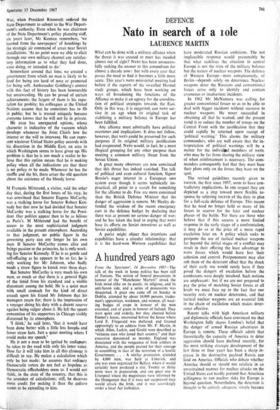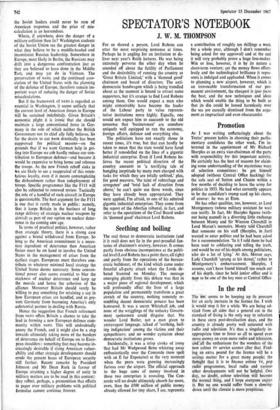Nato in search of a 1 ole
DEFENCE LAURENCE MARTIN
What can be done with a military alliance when the threat it was created to meet has receded almost out of sight? NATO has been unsuccess- fully seeking the answer to this conundrum for almost a decade now: but with every year that passes the need to find it becomes a little more acute. This year's NATO ministerial meeting had before it the reports of the so-called Harmel study groups, which have been working on ways of broadening the functions of the Alliance to make it an agency for the coordina- tion of political strategies towards the East. Only in this way, it is suggested, can NATO sur- vive in an age when its original task of stabilising a military balance in Europe has been fulfilled.
Any alliance must admittedly have political overtones and implications. It does not follow, however, that NATO could be preserved for such purposes if its original military justification had evaporated. Nan) would, in fact, be a most illogical grouping for any other purpose than meeting a common military threat from the Soviet Union.
A great many observers are now convinced that this threat has indeed vanished. The talk of political and even cultural function, Signor Brosio's eager interest in a European ABM system even though it seems technically im- practical, all point to a search for something for the alliance to do. Few are more convinced than the British Defence Minister that the danger of aggression is remote. Mr Healey de- fended the wisdom of the recent emergency cuts in the defence budget by declaring that there was at present no serious danger of war; and he has taken the lead in urging that NATO base its efforts on Soviet intentions as well as Soviet capabilities.
A purist might object that intentions and capakilities have a circular relationship: that it is the hard-won Western capabilities that have moderated Russian ambitions. The not implausible response would presumably be that what stabilises the situation in central Europe is not the state of the military balance but the nature of nuclear weapons. The defence of Western Europe—most conspicuously, of Berlin—depends solely on deterrence. Nuclear weapons deter the Russians and conventional forces serve only to identify and contain erroneous or inadvertent incidents.
In 1962 Mr McNamara was calling for greater conventional forces so as to be able to deal with bigger incidents without recourse to nuclear weapons. He never succeeded in obtaining all that he wanted, and the present trend is to reduce the number of troops on the Central Front with the justification that they could rapidly be returned upon receipt of `political warning.' This alarms the military commanders, who are well aware that the in- terpretation of political warnings will be a matter for the individgal members of NATO, who may be far from sharing the military view of when reinforcement is necessary. The com- manders consequently feel that they must base their plans only on the forces they have on the spot.
The revised guidelines recently given to SACEUR, the first since 1957, seem to have con- tradictory implications. In one respect they are depicted as a step toward more flexible re- sponse by relieving SACEUR of the duty to plan for a full-scale defence of Europe. This means that be need no longer hold so many of his forces in reserve for the later and nuclear phases of the battle. Yet there are those who believe that if this secures a more limited response in the early stages of a confrontation, it may do so at the price of a more rapid escalation later on. A policy which seeks to postpone the use of tactical nuclear weapons far beyond the initial stages of a conflict may result in their offering the least advantage to NATO forces which would have lost their cohesion and control. Postponement may also rob them of the deterrent effect that the shock of their early use would surely have if they posed the dangers of escalation before the combatants were deeply involved. Such notions are unpleasant: but if we are not prepared to pay the price of matching Soviet forces at all levels we must face up to the fact that our security rests on nuclear deterrence, and that tactical nuclear weapons are an essential link in the chain of escalation which makes deter- rence effective.
Recent talks with high American military and diplomatic officials have convinced me that Washington fully shares London's belief that the danger of armed Russian adventures in Europe is remote. These officials admit that theoretically the capacity of America to deter aggression should have declined recently, for the most striking strategic, development of the last three or four years has been a sharp in- crease in the destructive payload Russia can find on America. Officials who debate whether .America should or should not retaliate in an unrestrained manner for nuclear attacks on the United States can hardly pretend that American willingness to run nuclear risks for Europe is beyond question. Nevertheless, the deterrent is thought to be entirely adequate, simply because the Soviet leaders could never be sum of American responses and the price of mis- calculation is so horrendous.
Where, if anywhere, does the danger of a military collision then lie? Washington students of the Soviet Union see the greatest danger in what they believe to be a muddle-headed and inconsistent Russian leadership. Somewhere in Europe, most likely in Berlin, the Russians may drift into a dangerous confrontation just as they are believed to have done in the Middle East, and may yet do in Vietnam. The preservation of NATO, and the continued asso- ciation of the United States with the planning of the defence of Europe, therefore remain im- portant ways of reducing the danger of Soviet miscalculations. But if the framework of NATO is regarded as essential in Washington, it seems unlikely that the current level of American forces in Europe will be sustained indefinitely. Given Britain's economic plight it is ironic that she should maintain a large conventional force in Ger- many in the role of which neither the British Government nor its chief ally fully believes. So far the desire to cut BAOR drastically has been suppressed for political reasons—on the grounds that if we want German help in get- ting into Europe we cat hardly reduce our con- tribution to European defence—and because it would be expensive to bring home and rehouse the troops. As the new French rebuff sinks in We are likely to see a reappraisal of this osten- tatious loyalty, even if it means contemplating the disbandment rather than redeployment of troops. Specific programme's like the F111 will also be subjected to renewed review. Tactically the role of a handful of such aircraft in Europe is questionable. The best argument for the is one that is rarely made in public : namely, that it keeps Britain in the business of long range delivery of strategic nuclear weapons by aircraft as part of our option on nuclear deter- rence in the coming ABM age.
In terms of practical politics, however, rather than strategic theory, there is a strong case against a brutal withdrawal from Europe. So long as the American commitment is a neces- sary ingredient of deterrence then American forees must be on hand to involve the United States in the management of crises from the earliest stages. Europeans must therefore COB- tribute to whatever minimal local strategy the United States deems necessary. Some conven- tional power also seems essential to blur the starkness of nuclear deterrence and keep pp the morale and hence the cohesion of the alliance. Moreover Britain should surely be Willing to pay something for retaining a say in how European crises are handled, and to pre- vent Germany from becoming America's only substantial partner in dealing with Russia.
Hence the suggestion that French retirement fiO/n NATO offers Britain a chance to take the lead in forming a new European defence com- munity within NATO. This will undoubtedly annoy the French, and it might also be a step towards ultimately taking more of the burdens of deterrence on behalf of Europe on to Eurei- pean shoulders: something that may become in- creasingly desirable if rising American vulner- ability and other strategic developments should ercide the present bases of European security 'still further. Recent remarks by President Johnson and Mr Dean Rusk in favour of Europe attaining a higher degree of unity in military matters are to be read in this context : they reflect, perhaps, a premonition that efforts to paper over military problems with political formulae cannot continue forever.



































 Previous page
Previous page